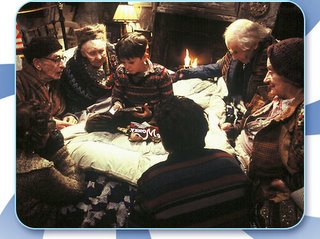http://www.roalddahl.com/
Tim Burton recently adapted Dahl's novel Charlie and the Chocolate Factory to film. Some people say this is a remake of the Gene Wilder film Willy Wonka and the Chocolate Factory-- which was also based off of Dahl's book. But Burton's film is not a remake of the old movie-- it is a new interpretation of the text.
Film is funny like that-- it becomes an entity all to its own, and because there are so many remakes in film, viewers often forget to consider that there might be another source-- unless it's Shakespeare. There are numerous movie versions of Hamlet, and no one thinks that they are remakes of each other-- people know they are interpretations of the play. So, the new Charlie in the Chocolate Factory is following in the footsteps of Shakespeare-- it is not a movie remake-- it is a new adaption of the text.
 Johnny Depp stars in this movie as the infamous Willy Wonka, and he raises the level of quirkiness within the film.
Johnny Depp stars in this movie as the infamous Willy Wonka, and he raises the level of quirkiness within the film.People say that this adaption of the text is much closer to the book than the Wilder version, and in some ways it is. It allows Wonka to say some of the rude things he says in the book, but it adds something to the book that I believe is a result of J.K. Rowlings. It adds reality to fantasy.
Dahl considered this book a fantasy. Although it starts with poor Charlie and his suspiciously nice family, everything that takes place in the factory could not possibly be real. Yet, in the film version, Wonka keeps having flashbacks to his childhood to explain to the audience why he is as quirky as he is.
Fantasy is losing some of its elements of imagination, because there has to be some realism. Yet, Dahl didn't want to create realism. We don't really want to think about a family so poor that they can only afford Cabbage Soup-- or where 4 Grandparents share one bed-- that's just not entertaining.

Dahl wants his audience to see Charlie's luck. Burton wants to add this didactic element of taking care of one's family and the importance of loving people who are in your life. I don't disapprove of Burton's message, I just don't think it's Dahl's.
So, why study Children's Lit-- because it is important-- and it is fun. It is important to look at what people do to Children's stories to try to accomplish their own agenda. And, it's fun to allow yourself to imagine the impossible every now and then.
2 comments:
Also, once a text has been adapted to film, it can't escape topical socio-politico-cultural references that invariably are alluded to,or read into the film.I loved Charlie and the Chocolate Factory with Johnny Depp as Wonka, but while watching the film, I was also all too aware of the recent comments on how this Wonka had parallels with M.Jackson(ofcourse that leads into a discussion of how consciously MJs persona is modeled after the literary image of Peter Pan and similar figure popular thru child.lit.)
Wow-- I hadn't thought about MJ as an important cultural figure when I look at all of children's lit. I'm so used to looking at lit away from culture, although I think it's important to look at digital culture-- but really MJ borrows from the digital as he appropriates himself as a never aging child. Something new to think about...
Post a Comment